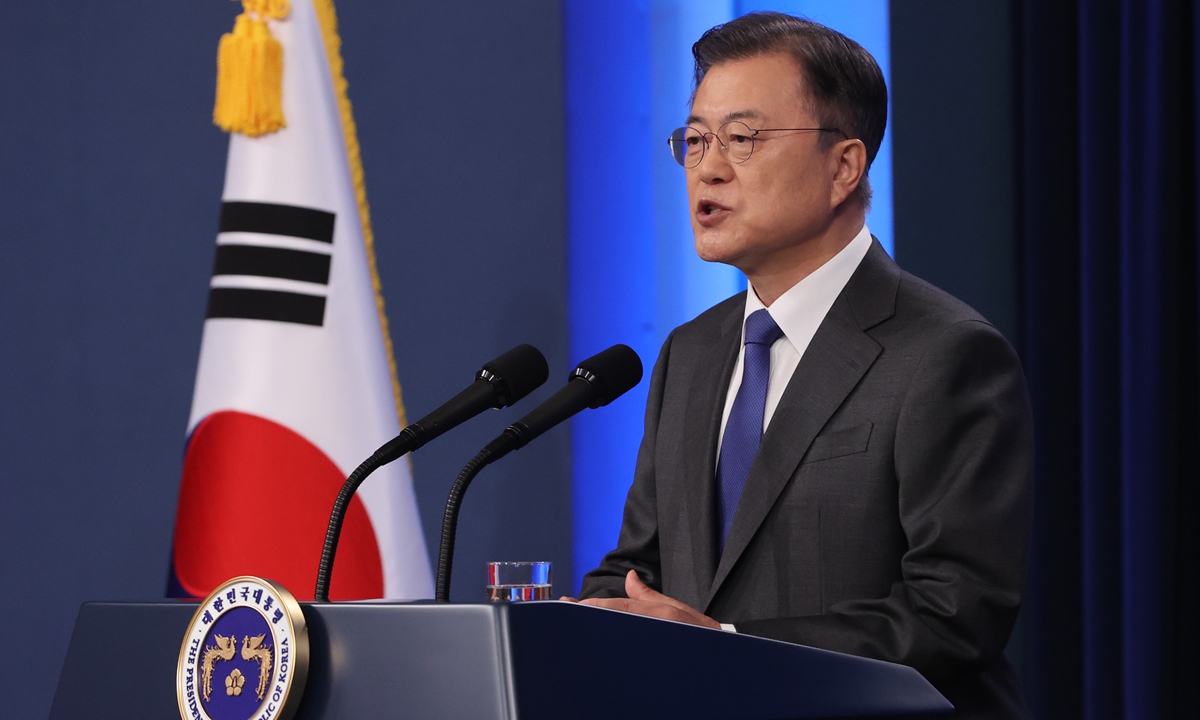
South Korean President Moon Jae-in said on Monday he sees his final year in office as the last chance to achieve a lasting peace with North Korea, and said it was time to take action amid stalled talks over Pyongyang's nuclear and missile programs. Photo: VCG
South Korean President Moon Jae-in said on Wednesday that Seoul is communicating with Beijing about the results of his recent talks with US President Joe Biden. Moon made this remark during a meeting over lunch with the leaders of five political parties, including his Minjoo Party of Korea, in the presidential Blue House, the Yonhap News Agency reported.
These overtures reflect the fact that Seoul is balancing itself between Beijing and Washington. Since the Trump administration, the US had launched a suppression campaign against China. But South Korea has refrained from following Washington's fanatical path. Although the joint statement after Moon-Biden talks implicitly targeted China, the statement was the greatest consensus they can reach on China-related issues. This was because South Korea needs the US for help in terms of COVID-19 vaccines and other issues.
Therefore, what concerns Seoul now is how it can explain to Beijing why it made this concession. With the termination of the Revised Missile Guidelines between the US and South Korea, Seoul retained some part of sovereignty. But the abolishment of the guidelines was not actively offered by Washington. Seoul had been demanding it for years. As for the timing of the termination, it cannot be ruled out that Washington aims to use the case to drive a wedge between Beijing and Seoul. After all, South Korea's development of missiles will affect China.
However, given the Blue House's reluctance to be involved in anti-China campaigns, it also cannot be ruled out that Washington wishes to use the termination of the guidelines to exchange for Seoul's concessions regarding China-related topics.
From Biden's moves to hold summits with Japanese and South Korean heads of state, it can be seen Washington is attaching more importance to its relations with two Asian allies - more so than the Trump administration. Still, Biden's primary work focuses on solving some leftover problems with the two Asian countries. These include mitigating disputes between South Korea and Japan.
But Washington's approach to address this issue is self-contradictory. South Korea's missile development will inevitably impact its ties with Japan. If Seoul-Tokyo relations cannot be eased any time soon, Washington relaxing restrictions on Seoul's ability to develop missiles will undoubtedly stir up new controversies.
Regardless of whatever Washington's strategic demands for Northeast Asia are, Seoul is sober-headed. After all, exchanges between South Korea and the US have both breadth and depth. The two hold almost no secrets with each other. The axis of South Korea's foreign policy is clear: the South Korea-US alliance. And South Korea will develop partnerships with China on the basis of the alliance.
Moon Chung-in, a special advisor to President Moon Jae-in, also emphasized on Wednesday that, "South Korea is an American ally, and we maintain a strategic cooperative partnership with China…alliance is more important than strategic partner… but... we are structurally dependent on China." This illuminates the point that South Korea is developing ties with China on the basis of consolidating and improving the relationship with the US. It will keep striking a balance between the two.
This trend will not change during Moon's presidency. But if conservatives come back to power after next year's election, it will be hard to predict whether or not the country will keep maintaining its balancing tactics. From this perspective, Washington's removal of limitations for Seoul's missile sovereignty aims to give Moon immediate diplomatic gains as a reward for his concessions in the joint statement. Meanwhile, it seeks to show to whomever that enters office next year that there are benefits from Washington.
While paying attention to the development of US-South Korea ties, China should also remain restrained, rational and tolerant toward South Korea. Seoul is willing to develop relations with Beijing. This is beneficial for both sides.
The author is an associate professor at the Renmin University of China. opinion@globaltimes.com.cn
